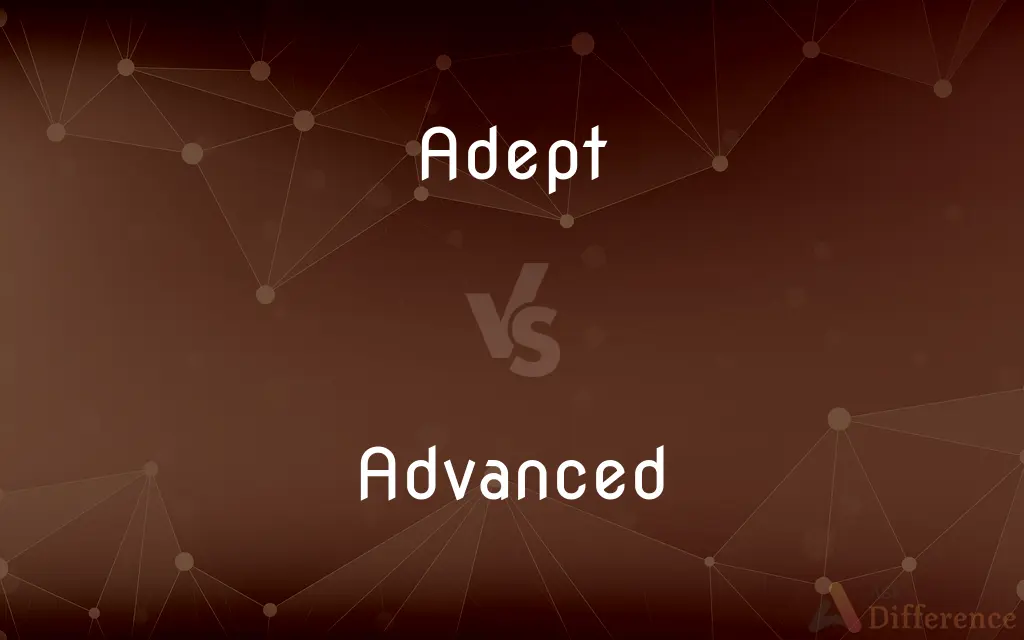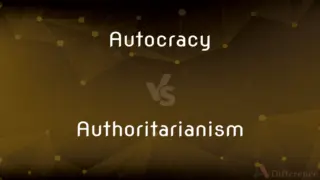Adept vs. Advanced — What's the Difference?
By Tayyaba Rehman & Fiza Rafique — Updated on April 8, 2024
Adept signifies high skill or proficiency in a specific area, focusing on individual ability, while advanced refers to a developed stage or level in progress or complexity.

Difference Between Adept and Advanced
Table of Contents
ADVERTISEMENT
Key Differences
An adept person demonstrates a high level of skill or proficiency in a particular activity or field, indicating mastery or expertise. This term emphasizes the individual's capability and often suggests a natural aptitude enhanced through practice and experience. On the other hand, advanced describes something that is at a developed or progressive stage, not just in terms of individual skill but also in technology, learning, and various fields of study. It conveys a sense of sophistication, complexity, or being ahead in development.
While adept is used to describe individuals with exceptional skills, highlighting personal achievement and expertise, advanced is more broadly applied. It can refer to courses of study that are beyond basic levels, technologies that are at the cutting edge, or theories and ideas that are forward-thinking. Whereas adept focuses on the personal level, advanced encompasses a wider range of applications, including the collective progress in a specific domain.
An adept person is not only skilled but also deeply knowledgeable in their specific area of expertise, often able to perform tasks with great efficiency and creativity. This term suggests a blend of learned skills and inherent talent. Conversely, something that is advanced is characterized by innovation or being at the forefront of its field, often implying a move beyond traditional or standard levels towards more complex or cutting-edge stages.
In educational contexts, adept usually refers to students or professionals who have achieved a high degree of competence in a subject or skill through deliberate practice and study. They are often sought after for their expertise and ability to navigate complex problems with ease. In contrast, advanced courses or degrees are designed to push the boundaries of understanding or skill, aimed at those who have already mastered foundational aspects and are ready to delve into more specialized or intricate areas.
The distinction also reflects in their usage in everyday language; adept is often used to compliment individuals, acknowledging their skill level and mastery, such as "an adept musician" or "an adept coder." Advanced, however, is used to describe stages, levels, or innovations, like "advanced technology" or "advanced degree," indicating a progression or a degree of development that is beyond the norm.
ADVERTISEMENT
Comparison Chart
Definition
Having very skilled or proficient in a particular area.
Far on in progress or development.
Usage
Describes individual ability and mastery.
Describes stages, levels, or developments in various fields.
Context
Personal skill and expertise.
Progression, sophistication, or complexity in a field.
Example in a Sentence
"She is an adept graphic designer with creative solutions."
"He enrolled in an advanced mathematics course."
Associated With
Mastery, expertise, proficiency.
Innovation, sophistication, development.
Compare with Definitions
Adept
Highly skilled or proficient.
She's an adept coder, capable of solving complex problems quickly.
Advanced
At the forefront of a field.
His research is in an advanced area of quantum physics.
Adept
Expert or highly knowledgeable.
As an adept negotiator, he rarely loses a deal.
Advanced
Progressed to a higher level.
His advanced skills in chess make him a formidable opponent.
Adept
Capable of performing tasks efficiently.
Her adept management of the team led to our project's success.
Advanced
Beyond the basic or introductory level.
She's taking an advanced course in biochemistry this semester.
Adept
Skilled through practice.
Years of practice made her an adept pianist.
Advanced
Incorporating the latest innovations.
The company is known for its advanced technological solutions.
Adept
Having mastery over a subject.
He's an adept historian, well-versed in ancient civilizations.
Advanced
Situated ahead or going before;
An advance party
At that time the most advanced outpost was still east of the Rockies
Adept
An adept is an individual identified as having attained a specific level of knowledge, skill, or aptitude in doctrines relevant to a particular author or organization. He stands out from others with his great abilities.
Advanced
Far on or ahead in development or progress
Negotiations are at an advanced stage
Adept
Very skilled or accomplished.
Advanced
Highly developed or complex.
Adept
A highly skilled person; an expert
"political consequences in getting rid of all the skeptics, unbelievers, and adepts of rival faiths" (Gene Lyons).
Advanced
Being at a higher level than others
An advanced text in physics.
Adept
Well skilled; completely versed; thoroughly proficient
Advanced
Ahead of the times; progressive
Advanced teaching methods.
Adept
One fully skilled or well versed in anything; a proficient
Adepts in philosophy
Advanced
Far along in course or time
An advanced stage of illness.
A person of advanced age.
Adept
One fully skilled or well versed in anything; a proficient; as, adepts in philosophy.
Advanced
Simple past tense and past participle of advance
Adept
Well skilled; completely versed; thoroughly proficient.
Beaus adept in everything profound.
Advanced
At or close to the state of the art.
Adept
Someone who is dazzlingly skilled in any field
Advanced
With greater complexity, more difficult
The option can be found under advanced settings.
I'm taking a course in advanced knitting techniques.
Adept
Having or showing knowledge and skill and aptitude;
Adept in handicrafts
An adept juggler
An expert job
A good mechanic
A practiced marksman
A proficient engineer
A lesser-known but no less skillful composer
The effect was achieved by skillful retouching
Advanced
Having moved forward in time or space (e.g. advanced ignition timing).
Advanced
In a late stage of development; greatly developed beyond an initial stage.
This is an advanced prototype, it already has most of the features the final product will have.
Advanced
(phonetics) Pronounced farther to the front of the vocal tract.
Advanced
Indicating a time ahead of the correct time.
Advanced
In the van or front.
Advanced
In the front or before others, as regards progress or ideas; as, advanced opinions, advanced thinkers.
Advanced
Far on in life or time.
A gentleman advanced in years, with a hard experience written in his wrinkles.
Advanced
Farther along in physical or mental development;
The child's skeletal age was classified as `advanced'
Children in the advanced classes in elementary school read far above grade average
Advanced
Comparatively late in a course of development;
The illness had reached an advanced stage
An advanced state of exhaustion
Advanced
Ahead of the times;
The advanced teaching methods
Had advanced views on the subject
A forward-looking corporation
Is British industry innovative enough?
Advanced
At a higher level in training or knowledge or skill;
An advanced degree
An advanced text in physics
Special seminars for small groups of advanced students at the University
Advanced
Ahead in development; complex or intricate;
Advanced technology
A sophisticated electronic control system
Advanced
Far along in time;
A man of advanced age
Advanced in years
A ripe old age
The ripe age of 90
Advanced
(of societies) highly developed especially in technology or industry;
Advanced societies
An advanced country technologically
Common Curiosities
Can a course be both adept and advanced?
A course can be advanced in terms of its content and complexity, but "adept" would not typically describe a course; it's more applicable to individuals' skills.
Is being adept the same as being an expert?
Being adept is akin to being an expert, as both terms imply a high level of skill, proficiency, and knowledge in a particular area.
Can beginners reach an advanced level without being adept?
Beginners can progress to advanced levels through study and practice, but becoming adept involves developing a deeper mastery and proficiency, typically beyond just advanced knowledge.
How do advancements in a field impact the adeptness of its professionals?
Advancements can provide new tools, theories, and methodologies for professionals, potentially enhancing their adeptness by enabling more sophisticated approaches and solutions.
What is the significance of advanced courses in education?
Advanced courses are crucial for deepening knowledge, challenging students, and preparing them for specialized or higher-level academic and professional pursuits.
What role does advanced research play in scientific fields?
Advanced research drives innovation, uncovers new knowledge, and pushes the boundaries of what is known, leading to technological and scientific progress.
What makes someone an adept in a field?
Being adept involves a high level of skill and proficiency, often achieved through extensive practice and experience in a specific area.
How does an advanced technology differ from an adept professional?
Advanced technology refers to innovations and developments that represent progression in a field, whereas an adept professional possesses high skill and mastery in their area of expertise.
Can one be adept at an advanced technology?
Yes, one can be adept at using or developing advanced technology, indicating not only proficiency with complex tools but also a deep understanding of their underlying principles.
How do individuals demonstrate their adeptness in a profession?
Individuals demonstrate their adeptness through their ability to efficiently solve complex problems, innovate, and apply their skills creatively and effectively in their profession.
Share Your Discovery

Previous Comparison
Autocracy vs. Authoritarianism
Next Comparison
Lawyer vs. JuristAuthor Spotlight
Written by
Tayyaba RehmanTayyaba Rehman is a distinguished writer, currently serving as a primary contributor to askdifference.com. As a researcher in semantics and etymology, Tayyaba's passion for the complexity of languages and their distinctions has found a perfect home on the platform. Tayyaba delves into the intricacies of language, distinguishing between commonly confused words and phrases, thereby providing clarity for readers worldwide.
Co-written by
Fiza RafiqueFiza Rafique is a skilled content writer at AskDifference.com, where she meticulously refines and enhances written pieces. Drawing from her vast editorial expertise, Fiza ensures clarity, accuracy, and precision in every article. Passionate about language, she continually seeks to elevate the quality of content for readers worldwide.
















































